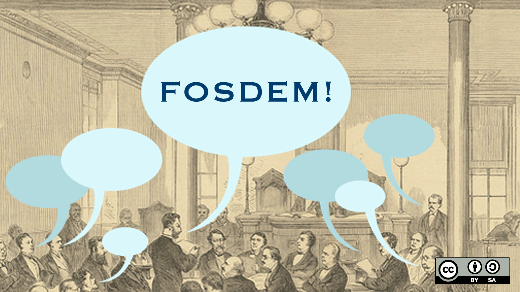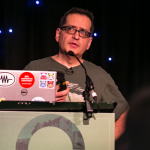For FOSDEM 2012, held last weekend in Brussels, I had the privilege of co-organizing (with Tom Marble, Karen Sandler, and Bradley Kuhn) the first-ever DevRoom track devoted to discussion of legal issues relating to free/libre/open source software. With several thousand attendees and hundreds of sessions, FOSDEM is one of the largest FLOSS conferences in the world, and surely the largest in Europe. This makes it all the more remarkable that FOSDEM is a free-admission, non-commercial community event, organized and administered entirely by volunteers.
The idea of a Legal DevRoom being untested, FOSDEM's organizers gave us a single day and a relatively small room. Our basic goal was to
distinguish our track from similar ones at other FLOSS conferences, by avoiding introductory material and focusing exclusively on advanced legal and related policy topics. We were pleasantly surprised to have received so many good talk proposals. As it turned out, our 75-person room was filled to capacity for nearly all the talks, and I am told that typically as many as 20 people had to be turned away from individual sessions.
The DevRoom opened with a presentation by Philippe Laurent on how various European courts have dealt with open source and open content licenses in specific cases (a number of which involved audience member Harald Welte as plaintiff).
Next up was Ambjörn Elder, who led a very interesting discussion on the political techniques used by free software advocates to try to influence government policy, and how these efforts might be made more effective through application of approaches used by parallel activist movements.
The inclement weather kept Armijn Hemel from arriving in Brussels for his scheduled talk on tracing build processes to identify a binary's sources. Karen and Bradley stepped in and gave an impromptu presentation on the role of fiscal sponsorship nonprofit organizations in free software.
Dave Neary then gave a lively talk discussing a number of historical examples of gray areas in free software licensing, particulary those associated with combinations of works under distinct licenses. As Dave's examples illustrated, more often than not the answer to interesting legal questions in free software is "maybe."
Allison Randal reviewed the legal history of free software, arguing that free software had moved from a 1960s-inspired emphasis on decentralization and individualism to greater use of formal legal structures (such as project-specific foundations and fiscal sponsorship organizations, along with more carefully-drafted licenses and contributor agreements). Recently, she noted, there seems to have been a swing back to decentralized individualism. I understood Allison to be suggesting that the recent trend represents a failure to remember the historical crises that had led to a perceived need for greater legal formality.
The brilliant Michael Meeks followed with a discussion of the problems that copyright assignment can cause for free software project communities. This was the first time I had met Michael in person; his statements on this subject have greatly influenced my own opinions on the dubious value of maximalist contributor agreements.
Loïc Dachary gave a talk explaining how commercial entities can ethically enforce the GPL without resorting to the notorious and, some would say, corrupt business practices of the former MySQL AB.
John Sullivan and I then gave successive talks that were motivated by recent claims, principally made by Matthew Aslett, that the GPL license family is in decline. John pointed out that such claims rely on data and statistics that are obscure and are likely based on questionable assumptions. For example, it is not clear whether programs of vastly different sizes are treated equally by those attempting to demonstrate a shift away from copyleft. John then discussed the results of his own analysis of the licensing of Debian packages, which suggests increased rather than decreased use of the GPL family.
My talk was rather different (for one thing, it relied on a fair amount of humor, including some good-natured trolling of Bradley). While I am not sure whether Aslett has spotted an accurate trend, much of what I have observed recently from my vantage point as Red Hat open source licensing counsel is consistent with a shift in favor of permissive licensing. Even if such a trend is illusory, there are various historical and economic reasons why we should expect it to have occurred, both intrinsic and extrinsic to the GPL. I concluded with some suggestions for how strong copyleft could be revived by those who support its policy goals and ethical underpinnings.
The DevRoom then featured two panels. One, which I moderated, discussed the implications of the rise of so-called app stores for free software, and included Giovanni Battista Gallus and Hugo Roy along with Bradley as panelists. The other was a discussion on the current state of the patent legal landscape, moderated by Karen, with Deb Nicholson, Ciarán O'Riordan and Benjamin Henrion as panelists.
The DevRoom closed with a talk by Mike Linksvayer that tied the drafting of the 4.0 versions of the Creative Commons license suite to broader public policy issues. Mike noted that we face a challenge larger than that of drafting voluntary public licenses, namely that of winning a greater share of public opinion for the view that software freedom is an important social good. He talked about some of the main ideas being discussed by those engaged in the redrafting of the Creative Commons licenses (how to deal with DRM, sui generis database rights, moral rights, and the nonfree NC and ND members of the CC suite; whether to expand or clarify copyleft scope; and whether CC licenses should have a source requirement like the GPL).
Most of the talks were recorded, and (if the audio quality is sufficiently good) are expected to be presented on future episodes of Bradley and Karen's Free as in Freedom podcast. The Legal Issues DevRoom was a great success, and I look forward to helping plan next year's instance of it. I conclude this report by acknowledging our debt to Tom Marble. The DevRoom would never have gotten off the ground or proceeded to flawless execution without Tom's ideas, guidance, and careful planning.






14 Comments